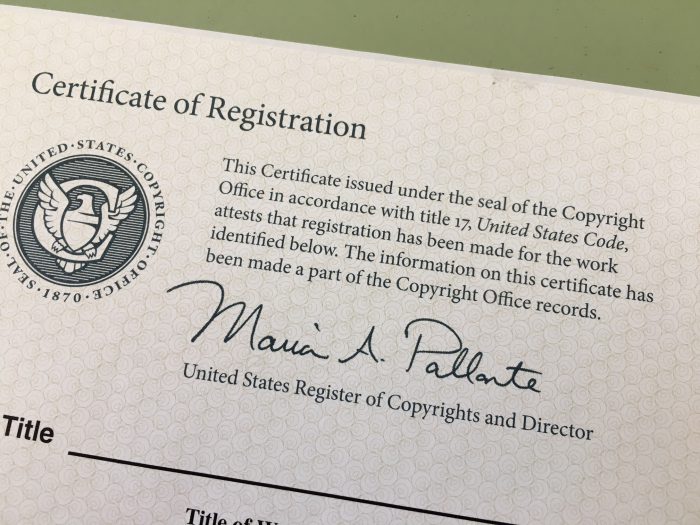You’ve toiled for months writing and rewriting your screenplay. A trusted reader or two have given some quality notes, you’ve polished, tweaked and proofed. You’ve finally reached those end-of-the-rainbow words: FADE OUT. It’s ready to go out. Life is good.
But…
Before you do anything else, copyright it. A U.S. copyright protects your script for 70 years after you die and costs $35. It’s an online form that takes less than 5 minutes to complete in your pajamas. That’s even if you have to hunt for your purse and dig out your credit card. Now, being the U.S government, it’s a little more involved than signing up for Netflix, but not much. Your name, address, a little detail about the author(s) and the script, your payment info, and upload a PDF. Boom. Done. And then with all the speed and efficiency of the federal government, in a month or two or three, you get a nifty certificate that shows your registration. It feels very official when you open that envelope.
There are other “script registration” services. The Writers Guild has one. Final Draft even includes a built in link to the WGA service and a few other guilds around the world. Screencraft has one that costs $89 bucks and is essentially is a registration with the U.S. Copyright office that a lawyer looks over before hitting “submit”. It also puts a backup copy on protected servers. These aren’t totally worthless or a complete waste of time, but the question is – why?
The WGA West service is little more than a date stamp that shows when you completed the script. It costs $20 for non-members ($10 for Guild members) and it expires in a five years. The WGA East gives you ten years. It’s a service the Guild provides that I’m sure has some value other than being a means for members to financially support the union, but I don’t really see it. The U.S. copyright will outlive you and is ironclad proof in court should the need arise.
I’ve submitted more than a few scripts to managers and agents and only in one case can I recall having been asked to provide a WGA script registration number. I sent a copy of my U.S. Certificate and they were fine with it.
My advice – just hit copyright.gov they have a helpful tutorial PDF on their eCo “electronic Copyright office” app, but if you’ve ever bought anything online, it’s not a lot more complicated than that. You can use Screencraft’s service if you think it’s worth an extra 55 bucks, but really, if you can diagram a sentence, you can probably fill out an online form.
Once you have done that, you don’t even have to tell anyone. In fact, for some weird reason it’s considered bad form in the film business to put a copyright notice on your script. Even small on the title page. Apparently this simple thing marks one as a novice and readers are reputed to take umbrage with it. And as listeners to Scriptnotes know, umbrage is a cash crop in Hollywood.
As an advertising guy this strikes me as bizarre because everything thing we send through legal gets dotted with ®s, ™s and ©s. But then corporate lawyers charge by the punctuation mark. Speaking of legal – I should point out that I’m not a lawyer and nothing here should be considered legal advice. But really, protecting your work doesn’t need to be complicated.
